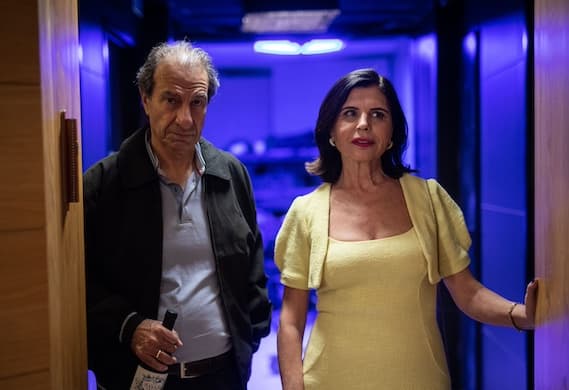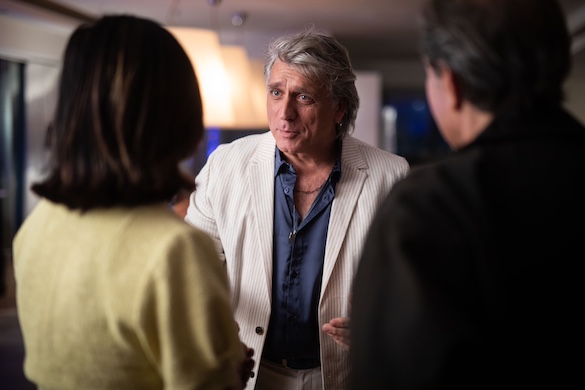New Film ‘Karaoke’ Poses Question: Is ‘Coming of Age’ Applicable to the Geriatric Set?
What’s lovely about ‘Karaoke’ is how it maintains a tried-and-true story arc while traversing byways that haven’t necessarily been tried and encompassing truths that are, in the end, complicated.

Mention a work of art touted as a “coming of age” narrative and you’re likely to conjure up visions of unruly young folks like Holden Caulfield in J.D. Salinger’s “Catcher in the Rye” or, maybe, Dustin Hoffman’s character in “The Graduate,” Benjamin Braddock. You remember Ben: the recently minted college graduate whose aimlessness leads him into the boudoir of Mrs. Robinson, a friend of the family indelibly portrayed by Anne Bancroft.
Young people grow in experience, insight, and, we hope, maturity, but how about men and women who undergo something similar at later moments of their lives? They are, presumably, older and wiser. Is “coming of age” at all applicable to the geriatric set? That is the question posed by “Karaoke,” the new film from Israeli writer and director Moshe Rosenthal.
The allusion to “The Graduate” isn’t arbitrary. When asked about the films that have inspired him, Mr. Rosenthal points to “every film that came out in 1999” — he was an adolescent at the time, I guess, and we know how adolescents absorb information — but then mentions, in specific, the Mike Nichols film. Like “The Graduate,” “Karaoke” treads a line between comedy and drama — but, please, let’s not call it “dramedy.” Jerry-rigged jargon gives short shrift to the nuances, some of them unsettling, in Mr. Rosenthal’s film.
What’s lovely about “Karaoke” is how it maintains a tried-and-true story arc while traversing byways that haven’t necessarily been tried and encompassing truths that are, in the end, complicated. What’s equally noteworthy is that this is Mr. Rosenthal’s first feature film. His 2018 short, “Our Way Back,” garnered notice and awards, and Mr. Rosenthal’s web series, “I Confess,” is set for adaptation here in the U.S.
As for “Karaoke”: It earned 14 nominations from the Israeli Academy of Film and Television, going on to win four Ophir Awards including best actor and best actress. As far as debuts go, that ain’t shabby.
“Karaoke” is set at Holon, a suburb of Tel Aviv dominated by apartment complexes of alarmingly generic mein. Meir (Sasson Gabay) is on sabbatical from his duties as a teacher; his wife Tova (Rita Shukrun) owns a boutique at the local mall. They’re in their 60s, fairly well off, and have two 30-ish daughters who clearly love them. Their lives are comfortable — maybe too comfortable. A lull has set in, especially for Meir. Asked to relate a cherished family story for his daughter’s new beau, he can barely muster the energy to do so. Should you need a case study in over-the-hill ennui, Meir’s your man.

Ditching the party on a flimsy pretext, Meir heads to the building’s parking garage. Much to his disappointment, he discovers that his car is blocked by a Maserati. His plans having been upset, Meir leaves a note on the Maserati’s windshield. The owner is likely the rich guy in the penthouse apartment who’s given to throwing rambunctious parties. A fellow tenant spits on the hood of the pricey car in solidarity with Meir. Meir looks on disconsolately. The unceasing slog that is life continues apace.
That is, until, Meir and Tova receive a dinner invitation from Itsik (a rakish Lior Ashkenazi) as an apology for his parking faux pas. They’re met at the door by a towering, supple, and sinuous trans-woman (Talleen Abu Hama) and are told that Itsik will be with them shortly. He is, as we can see and hear through the terrace window, engaged in a telephone conversation of some importance. Itsik is a former modeling agent and something of a high roller. He asks Meir and Tova if they’re into “swinging.” Our couple come to realize, like Dorothy in “The Wizard of Oz,” that they aren’t in Kansas, or rather Holon, anymore.
Prompted by Itsik’s unapologetic hedonism and the karaoke machine that exemplifies it, Meir and Tova undergo a spiritual, sexual, and cultural revitalization. This liberation isn’t without its snags, as disappointment, embarrassment, and a measure of humbling ensue. Class envy is touched upon, as is the social ambition that can be prompted by it, but Mr. Rosenthal doesn’t have an ax to grind. “I don’t have much interest in critiquing anyone … I try to make films that no matter the genre or the story are rooted in empathy and grace.”
As a result, Mr. Rosenthal explores the wants and needs of his all-too-human characters, providing them with apercus that are as funny as they are heartbreaking. He’s aided mightily in this endeavor by Mr. Gabay and Ms. Shukrun, who prove themselves fearless as a couple who come to realize that better days aren’t necessarily a thing of the past.
If that sounds like a spoiler, realize it’s the journey and not its culmination, that is the rationale for a film that is caustic, gentle, and forgiving in all the right measures.

